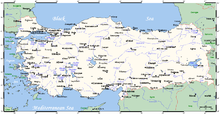- Outline of Turkey
-
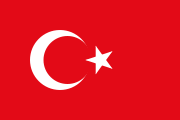
 The Flag of TurkeyThe Emblem of Turkey
The Flag of TurkeyThe Emblem of Turkey The location of Turkey
The location of Turkey See also: Index of Turkey-related articles
See also: Index of Turkey-related articlesThe Republic of Turkey is a sovereign Eurasian country that stretches across the Anatolian peninsula in Southwest Asia and Thrace (Rumelia) at the southeastern tip of the Balkan Peninsula in Southern Europe.[1] Turkey borders eight countries: Bulgaria to the northwest; Greece to the west, Georgia to the northeast; Armenia, Azerbaijan (the exclave of Nakhichevan), and Iran to the east; and Iraq and Syria to the southeast. The Mediterranean Sea and Cyprus are to the south; the Aegean Sea and Archipelago are to the west; and the Black Sea is to the north. Separating Anatolia and Thrace are the Sea of Marmara and the Turkish Straits (the Bosporus and the Dardanelles), which are commonly reckoned to delineate the border between Asia and Europe, thereby making Turkey transcontinental.[2]
Located astride two continents, Turkey's culture has a distinct blend of Eastern and Western tradition. A powerful regional presence in the Eurasian landmass with strong historic, cultural and economic influence in the area between the European Union in the west and Central Asia in the east, Russia in the north and the Middle East in the south, Turkey has come to acquire increasing strategic significance.[3][4]
Turkey is a democratic, secular, unitary, constitutional republic whose political system was established in 1923 under the leadership of Mustafa Kemal Atatürk, following the fall of the Ottoman Empire in the aftermath of World War I. Since then, Turkey has become increasingly integrated with the West through membership in organizations such as the Council of Europe (1949), NATO (1952), OECD (1961), OSCE (1973) and the G20 industrial nations (1999). Turkey began full membership negotiations with the European Union in 2005, having been an associate member since 1963, and having reached a customs union agreement in 1995. Meanwhile, Turkey has continued to foster close political, economic and industrial relations with the Eastern world, particularly with the states of the Middle East, Central Asia and East Asia.
The following outline is provided as an overview of and topical guide to Turkey:
General reference
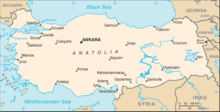 An enlargeable basic map of Turkey
An enlargeable basic map of Turkey
- Pronunciation:
- Common English country name: Turkey
- Official English country name: The Republic of Turkey
- Common endonym(s), i.e., in Turkish: Türkiye
- Official endonym(s):
 Türkiye Cumhuriyeti (help·info)
Türkiye Cumhuriyeti (help·info) - Adjectival(s): Turkish
- Demonym(s): Turks (in Turkish language: Türkler)
- Etymology: Name of Turkey
- International rankings of Turkey
- ISO country codes: TR, TUR, 792
- ISO region codes: See ISO 3166-2:TR
- Internet country code top-level domain: .tr
Geography of Turkey
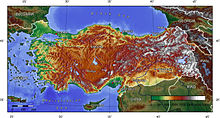 An enlargeable topographic map of Turkey
An enlargeable topographic map of Turkey Main article: Geography of Turkey
Main article: Geography of Turkey- Turkey is: a country
- Location: transcontinental (most of it lies in Asia, but a small part is within Europe)
- Northern Hemisphere and Eastern Hemisphere
- Eurasia
- Asia
- Southwest Asia
- Anatolia (also known as the "Anatolian Peninsula")
- Southwest Asia
- Europe
- Balkans (also known as "Southeastern Europe")
- Greater Middle East
- Asia
- Time zone: Eastern European Time (UTC+02), Eastern European Summer Time (UTC+03)
- Extreme points of Turkey
- High: Mount Ararat 5,137 m (16,854 ft)
- Low: Mediterranean Sea and Black Sea 0 m
- Land boundaries: 2,648 km
-
 Syria 822 km
Syria 822 km Iran 499 km
Iran 499 km Iraq 352 km
Iraq 352 km Armenia 268 km
Armenia 268 km Georgia 252 km
Georgia 252 km Bulgaria 240 km
Bulgaria 240 km Greece 206 km
Greece 206 km Azerbaijan 9 km
Azerbaijan 9 km
- Coastline: 7,200 km
- Population of Turkey: 72.561.312 (December 31, 20079 - 17th most populous country
- Area of Turkey: 783562 km2
- Atlas of Turkey
Environment of Turkey
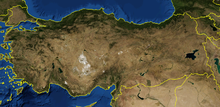 An enlargeable satellite image of Turkey
An enlargeable satellite image of Turkey Main article: Environment of Turkey
Main article: Environment of Turkey- Climate of Turkey
- Environmental issues in Turkey
- Ecoregions in Turkey
- Renewable energy in Turkey
- Geology of Turkey
- Protected areas of Turkey
- Biosphere reserves in Turkey
- National parks of Turkey
- Wildlife of Turkey
- Flora of Turkey
- Fauna of Turkey
- Birds of Turkey
- Mammals of Turkey
Natural geographic features of Turkey
- Glaciers of Turkey
- Islands of Turkey
- Lakes of Turkey
- Mountains of Turkey
- Alluvial plains of Turkey
- Peninsulas of Turkey
- Bays of Turkey
- Capes of Turkey
- Rivers of Turkey
- Waterfalls of Turkey
- Valleys of Turkey
- World Heritage Sites in Turkey
Regions of Turkey
Main article: Regions of TurkeyEcoregions of Turkey
Main articles: List of ecoregions in Turkey and Ecoregions in TurkeyAdministrative divisions of Turkey
Main article: Administrative divisions of TurkeyProvinces of Turkey
Main article: Provinces of TurkeyTurkey is divided into 81 provinces, called iller in Turkish
Districts of Turkey
Main article: Districts of TurkeyThe provinces of Turkey are divided into 923 districts (ilçeler; sing. ilçe).
Demography of Turkey
Main article: Demographics of TurkeyGovernment and politics of Turkey
- Main article: Government of Turkey and Politics of Turkey
- Form of government:
- Capital of Turkey: Ankara
- Elections in Turkey
- (specific elections)
- Political parties in Turkey
- Political scandals of Turkey
- Taxation in Turkey
Branches of the government of Turkey
Main article: Government of TurkeyExecutive branch of the government of Turkey
- Head of state: President of Turkey, Abdullah Gül
- Head of government: Prime Minister of Turkey, Recep Tayyip Erdoğan
- Cabinet of Turkey
Legislative branch of the government of Turkey
- Grand National Assembly of Turkey (unicameral)
Judicial branch of the government of Turkey
Main article: Legal system of the Republic of TurkeyThere are three supreme courts in Turkey:
- Constitutional Court of Turkey
- High Court of Appeals of Turkey
- Supreme Council of Public Accounts
Foreign relations of Turkey
Main article: Foreign relations of Turkey- Diplomatic missions in Turkey
- Diplomatic missions of Turkey
- United States-Turkey relations
International organization membership
The Republic of Turkey is a member of:[1]
Law and order in Turkey
Main article: Law of Turkey- Capital punishment in Turkey
- Constitution of Turkey
- Crime in Turkey
- Human rights in Turkey
- Law enforcement in Turkey
Military of Turkey
Main article: Military of Turkey- Command
- Commander-in-chief:
- Ministry of Defence of Turkey
- Turkish General Staff
- Commander-in-chief:
- Forces
- Turkish Army
- Turkish Navy
- Turkish Air Force
- Turkish Gendarmerie
- Turkish Coast Guard
- Military history of Turkey
- Military ranks of Turkey
History of Turkey
- Main article: History of Turkey and Timeline of the history of Turkey
Culture of Turkey
Main article: Culture of Turkey- Architecture of Turkey
- Cuisine of Turkey
- Ethnic minorities in Turkey
- Festivals in Turkey
- Humor in Turkey
- Languages of Turkey
- Media in Turkey
- National symbols of Turkey
- Coat of arms of Turkey
- Flag of Turkey
- National anthem of Turkey
- People of Turkey
- Prostitution in Turkey
- Public holidays in Turkey
- Records of Turkey
- Religion in Turkey
- Buddhism in Turkey
- Christianity in Turkey
- Hinduism in Turkey
- Islam in Turkey
- Judaism in Turkey
- Sikhism in Turkey
- World Heritage Sites in Turkey
Art in Turkey
- Art in Turkey
- Cinema of Turkey
- Literature of Turkey
- Music of Turkey
- Television in Turkey
- Theatre in Turkey
Sports in Turkey
Main article: Sports in TurkeyEconomy and infrastructure of Turkey
Main article: Economy of Turkey- Economic rank, by nominal GDP (2007): 17th (seventeenth)
- Agriculture in Turkey
- Banking in Turkey
- National Bank of Turkey
- Communications in Turkey
- Companies of Turkey
- Economic history of Turkey
- Energy in Turkey
- Energy policy of Turkey
- Oil industry in Turkey
- Health care in Turkey
- Mining in Turkey
- Turkey Stock Exchange
- Tourism in Turkey
- Transport in Turkey
- Airports in Turkey
- Rail transport in Turkey
- Roads in Turkey
- Water supply and sanitation in Turkey
Education in Turkey
Main article: Education in TurkeySee also
Main article: Turkey- Index of Turkey-related articles
- List of international rankings
- List of Turkey-related topics
- Member state of the Group of Twenty Finance Ministers and Central Bank Governors
- Member state of the North Atlantic Treaty Organization
- Member state of the United Nations
- Outline of Asia
- Outline of Europe
- Outline of geography
References
- ^ a b "Turkey". The World Factbook. United States Central Intelligence Agency. July 14, 2009. https://www.cia.gov/library/publications/the-world-factbook/geos/tu.html. Retrieved July 23, 2009.
- ^ Sabancı University (2005). "Geography of Turkey". Sabancı University. http://www.sabanciuniv.edu/socrates/ects/go.php?page=turkey_geography. Retrieved 2006-12-13.
- ^ Mango, Andrew (2000). Ataturk. Overlook. ISBN 1-5856-7011-1.
- ^ Shaw, Stanford Jay; Kural Shaw, Ezel (1977). History of the Ottoman Empire and Modern Turkey. Cambridge University Press. ISBN 0-5212-9163-1.
External links
- Government
- Presidency of the Republic
- The Grand National Assembly
- The Prime Minister's Office
- Ministry of Foreign Affairs
- Ministry of Interior Affairs
- Turkish Armed Forces
- Ministry of Defense
- Ministry of Culture and Tourism
- Public institutions
- Directorate General of Press and Information
- Turkish Statistical Institute
- Central Bank
- Treasury
- Competition Authority
- Undersecretariat of Customs
- National Intelligence Organisation
- State Planning Organisation
- Turkish Standards Institution
- The Scientific and Technological Research Council
- Additional profiles
- Other
Outlines General reference · Culture and the arts · Geography and places · Health and fitness · History and events · Mathematics and logic · Natural and physical sciences · People and self · Philosophy and thinking · Religion and belief systems · Society and social sciences · Technology and applied sciencesCategories:- Outlines of countries
- Turkey
- Turkey-related lists
Wikimedia Foundation. 2010.

